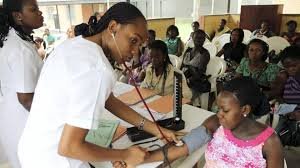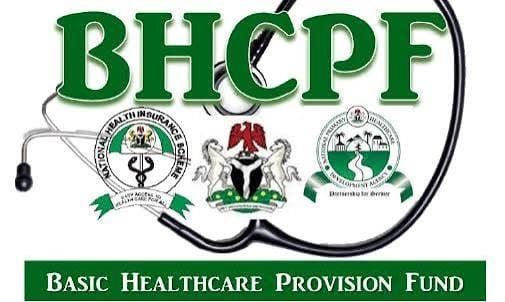
A nurse attends to a patient at a Primary Health Centre in rural Nigeria — a reflection of the nation’s struggling health system.
ABUJA, NIGERIA — In the heart of Africa’s most populous nation, a quiet emergency is unfolding — Nigerians are dying far too young. With a life expectancy of just 54.9 years, the lowest globally, Nigeria faces a deepening public health and economic crisis. Despite its vast human and natural resources, millions perish each year from diseases that should be preventable.
In this report, Korede Abdullah examines why Nigerians continue to die young — and what can still be done to stop it.
The Grim Reality of Dying Too Soon
According to United Nations 2025 data, Nigeria now ranks as the country with the lowest life expectancy in the world, far below the global average of 73.7 years.
Malaria, maternal deaths, hunger, and insecurity remain constant killers. Public health experts say these are not just statistics but evidence of systemic failure.
“We talk, but they don’t listen to us,” lamented Professor Oyewale Tomori, a leading virologist and public health expert, in an interview with Africa Health Report.
“What average are you even looking for again? We don’t start from the middle or end — we start from the back.”
His frustration reflects the reality of a country where health policies often fail to protect its citizens — especially the poor and vulnerable.
Trapped by Preventable Diseases
For decades, diseases that the world has largely controlled continue to ravage Nigerian communities. From malaria to cholera, from tuberculosis to Lassa fever, preventable diseases claim hundreds of thousands of lives yearly.
Professor Tomori described Nigeria’s response as “medicine after death.”
“When you bring all the control measures after an outbreak, people are already dying,” he said.
“Interventions are reactive, not preventive — that’s why we keep losing people.”
Experts agree that Nigeria’s sluggish health system leaves millions exposed to illnesses that could be easily avoided with early prevention and stronger public health structures.
The Double Burden: Old and New Killers
A new health dilemma now compounds Nigeria’s crisis. While infectious diseases persist, non-communicable diseases (NCDs) such as hypertension, diabetes, and heart disease are on the rise.
“We never used to have that before,” Tomori observed. “Now, we live the lifestyle of the Western world — eating processed food instead of organic food, and we don’t exercise.”
This “double burden” of disease — where old epidemics coexist with new lifestyle-related ailments — is overwhelming Nigeria’s fragile health system, cutting lives short and stretching resources thin.
Poverty and Hunger: The Silent Killers
Behind the statistics lies an even deeper tragedy: poverty. For most Nigerians, staying alive has become a luxury.
“Poverty means you don’t have access to good healthcare,” Tomori said. “When you fall sick, you can’t afford hospital bills, so you go without care.”
With millions unable to afford nutritious food, basic medicine, or even clean water, malnutrition and disease thrive. Nigeria ranks among the world’s poorest nations, and experts warn that poverty fuels poor health from birth to adulthood.
“When you see a man walking on the street,” Tomori said starkly, “it’s often his dead body moving around.”
Broken Health Systems, Broken Promises
Nigeria’s healthcare infrastructure tells a story of neglect. Primary Healthcare Centres (PHCs) — the bedrock of preventive care — are crumbling.
“I live near a PHC with no ambulance, no bicycle, nothing!” Tomori exclaimed.
“Don’t let anyone tell you we don’t have money to improve healthcare in Nigeria. We are not a resource-limited country; we are resource-wasteful.”
The underfunding of hospitals, chronic corruption, and weak accountability have eroded trust in public health institutions. As a result, preventable deaths continue unabated while public officials enjoy overseas medical trips.
The Economic Toll of Poor Health
The crisis extends far beyond hospitals. According to Dr. Olanrewaju Saliu, a Senior Lecturer at Ekiti State University, the health crisis mirrors Nigeria’s economic fragility.
“When citizens cannot afford preventive care or nutritious food due to low income and inflation, it directly shortens their lifespan,” Dr. Saliu told Africa Health Report.
He explained that poor health and poverty reinforce each other in a vicious cycle: weak incomes limit healthcare access, while poor health reduces productivity.
“A sick population cannot contribute effectively to national development,” he warned.
“Health and economy are intertwined — and both are failing together.”
Lost Opportunities, Misplaced Priorities
Dr. Saliu linked Nigeria’s low life expectancy to decades of policy neglect and economic mismanagement.
“Nigeria must diversify its economy, expand health insurance, and invest in human capital,” he advised. “Our biggest resource is our people — but we are losing them too soon.”
He added that poor working conditions and inadequate infrastructure have pushed many healthcare professionals abroad, leaving the system hollow.
“When our best doctors and nurses migrate, what remains are empty hospitals and frustrated patients,” Saliu noted. “That is how nations die before their people do.”
The Cost of Neglect: A Nation at Risk
Public health experts insist Nigeria’s low life expectancy is not a mystery — it’s the outcome of choices. Chronic underinvestment, poor leadership, and weak accountability have created a system where illness and death are predictable.
The result: a country where maternal mortality remains among the highest in the world, where malaria still kills hundreds daily, and where insecurity disrupts access to clinics and vaccines.
Tomori captures the sentiment bluntly:
“If we don’t have healthy children who grow into healthy adults, our life expectancy will keep declining.”
Pathways to a Healthier Future
The solutions, experts say, are clear. Nigeria must prioritise prevention, not reaction. That means rebuilding its primary healthcare system, improving nutrition, and ensuring universal health coverage.
Both Tomori and Saliu emphasise the need for political will.
Increase funding for Primary Health Care Centres.
Expand the National Health Insurance Authority to reach informal workers.
Invest in maternal and child health and train more community health workers.
Ensure transparency and accountability in health budgeting.
Dr. Saliu believes this is possible if leaders see health as an investment, not an expense.
“Health is not charity; it’s the foundation of national productivity,” he said.
A Call to Action: Choosing Life Over Statistics
Nigeria’s low life expectancy is not inevitable. It reflects policy neglect and misplaced priorities — not destiny. Experts agree that the nation still has the capacity to turn the tide.
To live longer, Nigerians must demand better. Communities need stronger public health education, governments must be held accountable, and investments must target the people, not politics.
“We have the resources,” Professor Tomori insisted. “What we lack is commitment.”
Until Nigeria decides that every life matters, the nation will continue to bury its potential long before its time.




